Jonathan Glazer’s The Zone of Interest‘s power comes in how it explicitly, repeatedly denies its audience opportunities to give into sentimentalism and self-aggrandization. A vast amount of films about the Holocaust frequently fall into the projection of sentiments that, even while depicting violence so graphic it represents the absolute abattoir of human hatred, still keep the audience emotionally and spiritually safe. Indeed, at each of these films’ conclusion, the audience is continually prompted to identify monstrous evil wherever they see it, and play a role in stepping up to hatred and bigotry—a form of heroism they are encouraged towards. On the other hand, Glazer’s confrontation of the audience is based on familiarizing them to the day-to-day lives, routines, and aspirations of the Nazis who actively participated in genocide so that the audience is unable to fall back to self-congratulation. The safety of distance between them and the Nazis’ sheer monstrosity is closed with quietly brutal force, and for once, the audience is finally confronted with how easily they, too, can fall into that place of dehumanization at its worst if left unchecked. Zone’s depiction of that dehumanization is as simple as a pastoral garden in an upper-middle-class estate, in which businessmen, military leaders, and their families navigate their daily lives directly next door to unfathomable cruelty, and compartmentalize their deliberate role in atrocity to present themselves as a horrifying ideal.
As a result, any discussion of The Zone of Interest merits serious consideration about its aesthetics, which in effect are a silent condemnation of the vérité-esque aesthetics and sentimentalism of the Holocaust films that have preceded it. Beyond being a film about Nazis, the formal construction of Zone deliberately reflects the ideology of the Nazis it depicts—as sterile, spotless, and pure as both the master race and ethnostate they intended to create. It allows for the Höss family at its center to present themselves completely contrary to what we expect, distancing themselves from, again, the bold-faced displays of antisemitic hatred and violence so frequently associated with the Nazis. Zone operates on the predicated knowledge that its audience is already aware of the machinations of the Holocaust, and inhabits the Nazi perspective to show exactly how, even with the supposedly airtight presentation behind something like the Höss family’s household and work life—the evil we know of to this day still stains the soil of the vines that “will grow and cover it all.”
You hear it in the industrial rumble of death behind their house—in the screams of those being slaughtered, in the barks of dogs, the rattling of motorcycles, and the howling orders of commandants and military leaders. You notice it in the “trinkets” that the children pick up which are obvious remnants of the murdered. You can glimpse it in the smoke of the crematorium and the trains arriving at the camp. And in all instances, you never actually see anything. The Höss family’s rejection of their humanity and their capacity for empathy—even in their children, who repeatedly simulate the cruelty they hear and see in the camps—only works insofar as they compartmentalize and condition themselves to every sight and sound of death that surrounds them. To that end, the film’s boldest quality is how the audience is given the unfathomably confrontational chance to do the same. And in turn, the film’s impact comes in our collective imperative to completely refuse that chance.
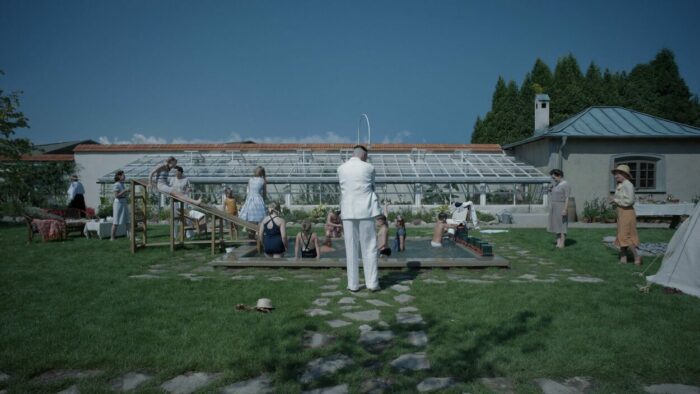
This is what makes The Zone of Interest such a unique outlier when it comes to the Holocaust film canon. For a history of films that have frequently occupied the perspective of the Jewish victims, here is a work which boldly takes on that of the oppressors and uncannily comprehends its workings. But the canon as it exists is a precarious thing—classics from it, such as Steven Spielberg’s Schindler’s List and Alain Resnais’s Night and Fog, have always existed in deep contention in regards to critical and academic consensus, even despite the near-universal praise apparent in how they have been received. In fact, the importance of perspective has been the primary component that has driven that contention throughout entire decades.
Extensive examination into the history of Holocaust films—fictional or documentary—reveals a deep emphasis on the importance of Jewish perspectives, not just in the filmmaking, but also in the narratives presented. Indeed, Schindler’s List and Night and Fog have individually come under fire themselves for these exact reasons. Frequently cited criticisms of the former have made a significant point out of the fact that in the process of protagonizing Oskar Schindler, Schindler’s List presents a “world in reverse”—in the words of Shoah director Claude Lanzmann—by presenting the Holocaust through the perspective of a reformed Nazi, and featuring the Jews as a component in his narrative of redemption. Night and Fog, while pivotal for being among the first films about the Holocaust to have been made in the genocide’s immediate aftermath, also suffers from the limitation of most documentaries around that time, in that the weight of the Holocaust as a specifically antisemitic genocide was largely an unknown notion to Resnais and his team. As a result, the film’s perspective is more broad about memorializing all victims to the Holocaust, something that many like Cinéaste’s Robert Michael have critiqued as “silently [burying] six million Jews in universal genocide.”
Even still, another facet of the canon worth considering is that of exploitation, something that Zone evades with remarkable grace even despite presenting the Nazi perspective and worldview. Even beyond the scope of films and media widely decried as irresponsible such as The Boy in the Striped Pajamas, it is all too frequent for people to learn about the Holocaust through gruesome images and depictions of the violence that do nothing to honor the memory of the actual lives taken in the genocide, and only serve to further victimize and contort the lives of Jewish people into symbols. And the consequences of that contortion on the collective perception of the Holocaust only become that much more urgent once one realizes that we are barreling our way towards a post-memory culture—one in which the loss of the last Holocaust survivor grows more imminent by the second, alongside the testimony they could provide.
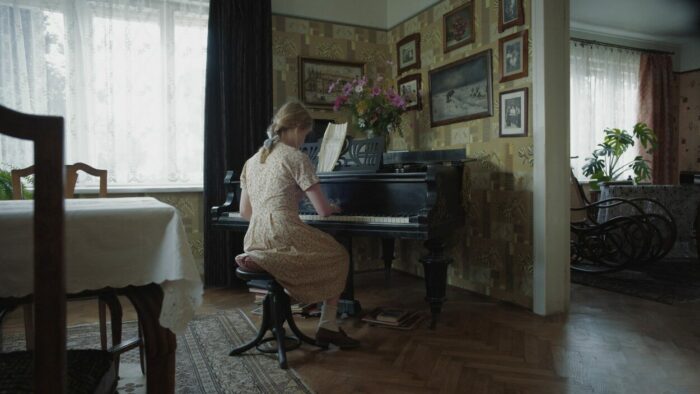
So The Zone of Interest—alongside the resounding praise it has received so far—represents a very unique point within this same canon. The success of the film is largely predicated on how it takes the polar opposite perspective of the Jewish victims, survivors, and descendants of the Holocaust; it instead chooses to embody the viewpoint of the Nazis who deliberately instituted and left behind all of this unbelievably tragic detritus. And its impact lies in the fact that its intentions are completely different than those of most of its contemporaries. It is not yet another addition to the dramatization of Jewish testimony and suffering; it is a presentation of Nazi life that works on our already existing understanding of that history, and how that understanding runs horrifyingly counter to the idyll of the Hösses’ ethno-fascist dreamworld.
And yet, its place in a cinematic canon so flawed that even its most iconic examples have not proven immune from criticism must be thought through and contested in some form. If some of the most renowned examples of Holocaust films do not primarily feature Jewish perspectives, lean far into depictions of violence that only serve to exploit and further victimize the memory of the Jewish people, or some unfortunate combination of both, it speaks to a canon in need of change in that specific direction. The rapid approach of the post-memory culture only further necessitates a Holocaust film canon that responsibly prioritizes the Jewish perspective, especially as film and mass media inevitably will ascend the pecking order of the ways through which the population learns about atrocities like the Holocaust in the wake of the absence of continuing testimony.
With the growing prevalence of this importance, it becomes apparent that The Zone of Interest’s unique place in the canon is precisely because of its vastly different priorities. Its goal is not in playing a role in and contributing to the preservation of the victims of the Holocaust, but rather the attitudes exhibited by those who allowed the genocide to persist. And Zone’s defiance of the traditional frame of the “Holocaust movie”—something that the cinematic vernacular has always defined as a contributor to intensely emotional, often fictionalized memorialization—means that its uniqueness is defined by how the film has, in essence, redefined the term. No longer might Holocaust films be susceptible to being scrutinized solely within the framework of how the Jewish survivors, victims, and descendants are responsibly depicted, honored, and memorialized. Here is a massively important work that offers a uniquely difficult, narratively oppressor-based framework to operate within, in which the audience’s focus and subject of potential identification is those of the most reviled people in history—a genuine confrontation of our own moral frameworks and the path that our own complicity can lead down.
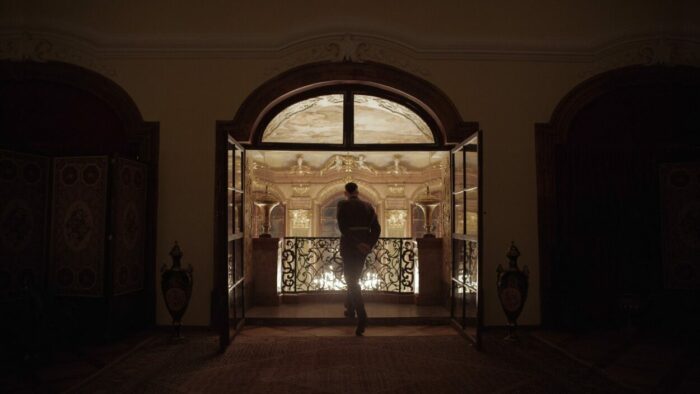
Both perspectives are incredibly important as we approach the post-memory culture; we must ensure the meaningful and constructive preservation of Jewish memory, legacy, testimony, and perseverance in all forms of media, while also spiritually arming ourselves against the tendencies and banalities that resemble those of the people who commit genocide, primarily through familiarizing ourselves with how they present themselves. The vision of an “ideal Holocaust movie,” as a result, cannot be defined by a concrete example. Rather, it will likely instead be defined by the failures of Holocaust films incapable of stepping up to the moral imperative of depicting an epochal atrocity—an imperative so insurmountable with vastly differing approaches that, in turn, no single kind of Holocaust movie can ever be the ideal example for it.
Alas, the relevance of The Zone of Interest does not merely stop at its place in the Holocaust cinema canon and the impending arrival of the post-memory culture. For a film with such stark, immediate relevance, we now must ground ourselves in the present day.
On the night of the 2024 Academy Awards, no one could have reasonably anticipated the relative lull of the ceremony to come. In the wake of the infamous “slapping incident” with Will Smith and Chris Rock, a poorly thought-out COVID-era ceremony, and consistently negative reviews even despite relative consensus on the winners, a show in which everything went both smoothly and quickly would prove to be a welcome outlier. Most of the winners proceeded without controversy, outside of perhaps a few unwelcome snubs and several pleasant surprises. And yet, perhaps the biggest spurring of controversy came from the film that most explicitly eschewed the sentimentalism generally attracting the attention of awards voters; The Zone of Interest. Its winning of Best International Feature was not the biggest controversy of the night, as pundits generally projected a resounding awards victory for the film—rather, it was Glazer’s remarks immediately after that shook up the most debate.
In his speech, Glazer remarked that he was “[refuting his] Jewishness and the Holocaust being hijacked by an occupation which has led to conflict for so many innocent people,” further elaborating on the need to resist the dehumanization that led to “the victims of October the 7th in Israel and the ongoing attack on Gaza.” And in the immediate moments that followed, viewpoints on Glazer were split down the middle. There were those who praised him for being the only one who made a statement on the current crisis in the Gaza Strip among those who won awards that night, and then there were those who, for a myriad of reasons, did not view his remarks kindly.
Whatever the case, Glazer’s speech was bound to inflame strong opinions, and the results almost certainly spoke for themselves. Some took his admittedly ambiguously worded remarks out of context. Many believed that Glazer was refuting his Jewishness itself, rather than rejecting the exploitation of both his identity and the Holocaust by the state of Israel. Others, like Holocaust survivor David Schaecter, stated that Glazer was equating the unfathomable barbarity of Hamas’s October 7th attacks to Israel’s supposed self-defense against Gaza. Still others believed he was conflating the occupation and attack on Gaza to the Holocaust itself—a distinction that Glazer seemed to have already explained by saying that The Zone of Interest, and by extension, the systematized atrocity it depicts, represented “dehumanization at its worst.” As of writing, the outcry has culminated in an open letter from over 1,000 Jewish filmmakers denouncing Glazer for, in their words, “drawing a moral equivalence between a Nazi regime that sought to exterminate a race of people, and an Israeli nation that seeks to avert its own extermination.”
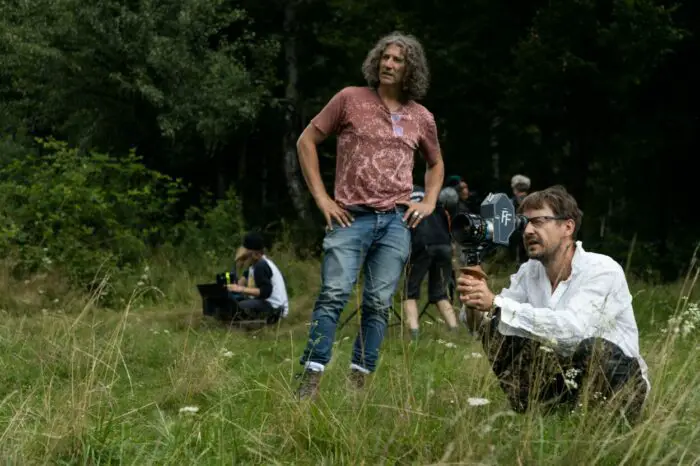
And yet, Glazer’s observations of dehumanization resulting in both the violence that occurred on October 7th and the attacks against Gaza are indisputable. It needs saying that the responsibility for Hamas’s trail of murder, torture, and abduction lies with Hamas alone. There is not a single facet of the storied history of oppression behind the Israel-Palestine conflict that could possibly justify the level of brutality left behind on the worst, most vicious slaughtering of over 1,200 Jewish people since the Holocaust itself. Its sheer severity places it beyond any excusability for any denial of its painstakingly recorded specifics. However, Israel is, in turn, using institutionalized anti-Arab bigotry and their maneuvering of Palestinian administrations to justify their continued campaign of forcibly removing Palestinians from Gaza, as well as their disproportionate, targeted attacks designed to starve and bomb the existing civilian Arab population. At the time of writing, over thirty thousand Palestinians are now dead, the majority of them women and children, with no upper ceiling and no conscience to be found from Prime Minister Benjamin Netanyahu’s far-right, extremist-composed administration, even in the face of their litany of war crimes.
None of this carnage, on any side, is remotely justifiable under the label of “self-defense.” Every element of this crisis is a tragedy beyond any fathom. Every aspect of this conflict has aggravated feelings of profound resentment and spawned equally profound levels of dehumanization. The existence of a secure Jewish homeland is a reasonable demand to make after eighteen centuries of ever-present oppression and bigotry, for which the Holocaust has proven itself as that bigotry’s historical apotheosis. The current state of that homeland, however, serves only Western securities and interests, and demonstrably threatens the lives of the peoples who inhabit it and its occupied territories, having already led to widespread death and suffering on such an unbelievable scale.
In making his speech at the Oscars, Glazer understood best of all that The Zone of Interest reflects the logical endpoint of that dehumanization. The Holocaust is a systematized, antisemitic genocide whose paralyzingly immense scope of death and destruction should immediately clarify it as being completely beyond any modern analogue, resemblance, or comparison. As a perverse result, however, it is also regarded as the standard to which all genocides are compared, leading to the word “Holocaust” itself becoming a vapidly wielded replacement term and buzzword. However inhumane it is, Israel’s ongoing bombardment of Palestine and Gaza is not currently the modern analogue to the Holocaust, and to claim so is to disingenuously shirk the facts and vital specifics of their vastly disparate political realities. At the same time, the widespread, undeniably tangible trauma that the Holocaust and other antisemitic calamities wrought onto generations of Jewish people should never be used to justify Israel’s actions, and certainly not to draw abhorrent, falsely propagandistic equivalencies between Palestinian civilians and the Nazis.
Here, we reach perhaps the most important and quietly expressed ethos of The Zone of Interest—one about the rejection of empathy, something that the existing Holocaust canon, up to this point, has also failed to represent in how it approaches depictions of the atrocities committed.
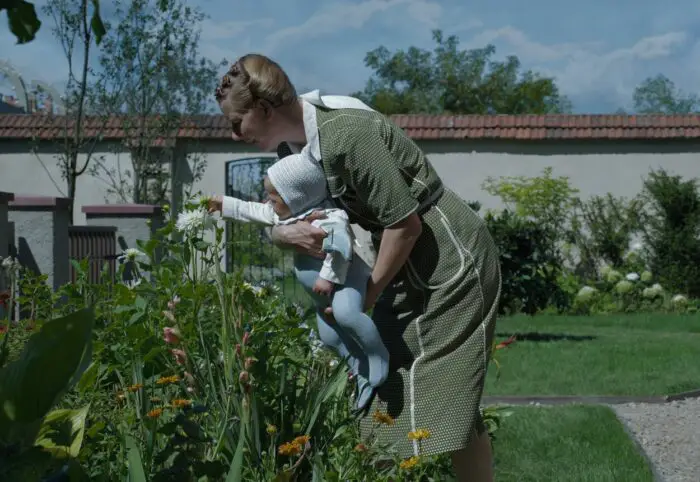
In the final moments of The Zone of Interest, Rudolf Höss (Christian Friedel) is forced to confront, for the first time, his real legacy. All throughout the film, the presentation of his and his family’s life has been, as mentioned, strictly bureaucratic and clean. Without the rumble of death that surrounds his household, and without the requisite knowledge of the machines of mass murder he is constructing, one can understand how easy it is for a man to compartmentalize his role in ethnic cleansing, because he is not merely working and living like a normal day in the life. He is a man with a goal, a high-ranking official, a professional in his field, and widely respected enough to obtain a new operation named after him—one that would deport hundreds of thousands of Jewish people and ship them off to their brutal demise.
But as he violently retches and heaves while descending the steps of his office, we see what it is he might be getting nauseated at. The film soon judiciously reveals a vision of the present day, in which workers of the Auschwitz State Museum clean out the glass panes housing hundreds of thousands of burnt shoes, suitcases, clothes, and objects serving as indisputable evidence of the Holocaust’s unbearably horrifying detritus. They are allowing for these objects to be seen more clearly through absolutely spotless barriers; the diametric opposite of the obscurity that the Höss family, and by extension, the film itself, constructs. That same detritus is what we remember—and must continue to remember—the Höss family and the Nazis by. It is the farthest possible stretch from the bureaucratic glory that Rudolf is aspiring to. It is the nightmare he has feared, implicitly or not, this entire time.
The film cuts back to Rudolf, the area around him dark and devoid of any warmth. Even after gazing at this—even after paying witness to the perversion of his legacy that awaits him—he descends further down stairs that lead him into absolute darkness. Operation Höss is due to continue, because Rudolf has rejected his empathy totally, inserting in its place an unfathomable violence inside his soul that—in certain interpretations of the film’s final moments—his body has just tried to retch and extricate out of him. The Zone of Interest works almost like a successor to Glazer’s previous film Under the Skin—a film about an emotionless alien trained to throw men into extraterrestrial machines of death who learns about her desire for humanity through her nascent capacity for empathy. Here, we see a contorted mirror image; human beings who have annihilated their own capacity for empathy and alienated their own humanity in order to throw millions of people into machines of death without conscience.

Glazer has demonstrated an understanding of how history could very well repeat itself, and what the current situation could easily devolve into if we are to reject our empathy completely in exchange for dehumanization. Nothing about the evil and violence that results from that rejection is banal, but it is more than happy to take on a banal appearance and presentation that is a grotesque facsimile of our own everyday lives. It is in the act of finding the Nazis’ facsimile familiar that The Zone of Interest derives its most profound impact, and deviates most heavily from a predominantly victim-focused Holocaust canon; one whose perspectives orient more towards preservation than Zone’s urgent cautionary tale directly confronting our attitudes and propensity towards atrocity. Both are necessary for the post-memory era that will soon arrive, an era that will bring forth untold amounts of misinformation and denial that we all must identify and resist. But for this current moment, Glazer’s interest lies in demonstrating that the complicity we exhibit to the violence of dehumanization today will inevitably become compartmentalized participation in mass violence in due time if we do not make a concerted effort towards empathy wherever it is urgently, terribly needed.
As Israel’s relentlessly excessive assault on Gaza’s civilians continues, and as the aftershocks of October 7th’s uncompromising brutality and abductions still ripple through the civilian population of Israel, Glazer’s comparatively conciliatory message is eerily prescient and strikingly powerful. Even still, it is a warning that has mustered overzealous amounts of criticism from those unwilling to heed his prescient claims of what happens when we reject the empathy that makes us human and treat the marginalized as monoliths. Whether that be for our own self-interest, the interests of an ideal we aspire to, the interests of the nation we serve, or otherwise, The Zone of Interest is not just a cautionary tale, but an invitation to see past all these barriers of “interest” that permit us to reject our empathy, and to obscure—like the Hösses’ garden wall—the horrific concerns we must concertedly invest our empathy and genuine interest in.
Seeing over that garden wall will not be as easy as labeling those who participate in industrialized mass murder on the other side as “monsters.” To glimpse the other side of that wall will take the concerted effort to realize that the “monsters” we label as such, even as they have rejected their empathy and commit unfathomable acts of violence, are only as grotesquely monstrous—and, perversely, even more so—precisely because they, too, are still just as human as we are. Glazer is pleading for us to recognize how easy it is to annihilate our empathy, take on their everyday routines, and become just as monstrous as them. We must, must, must listen.




